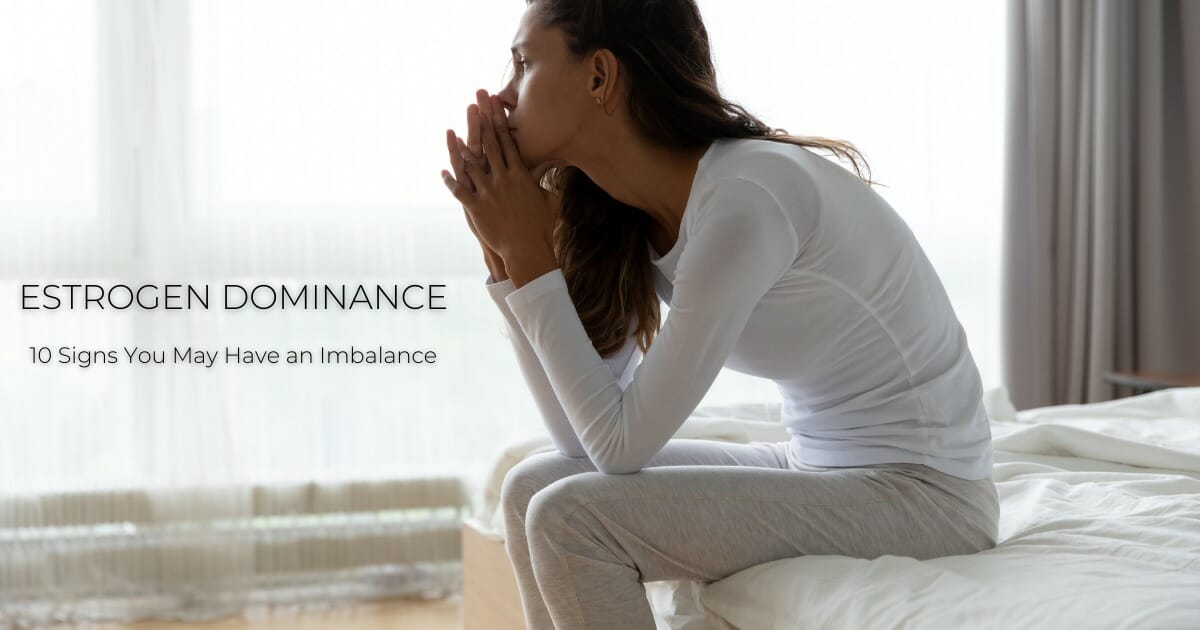Estrogen Dominance Symptoms | 10 Signs You May Have an Imbalance
By Ron Castro/ C.E.O Rejuvenatehrt
Estrogen dominance occurs when the body is not producing a sufficient amount of progesterone, resulting in an Estrogen to Progesterone ratio that is out of balance. Estrogen Dominance Symptoms can be difficult to diagnose, as they can appear in many different forms. If you think you may be experiencing Estrogen Dominance, look to this article. We outline what estrogen dominance is, 10 common signs of estrogen imbalances, and your various treatment options.
What Does Estrogen Do?
Estrogen is a powerful hormone that plays an essential role in the female body. Estrogen helps regulate a variety of processes, including the menstrual cycle, fertility, pregnancy, sexual function, and metabolism. It also plays a key role in maintaining bone density, cognitive functioning, and cardiovascular health.
Estrogen is produced by the ovaries and adrenal glands in women, and it is responsible for many of the physical changes associated with puberty and adulthood. It is vital for the development of secondary sex characteristics during puberty such as breast growth and hips widening, as well as modulating libido and sexual drive.
In addition to its important role in sexual functioning and reproduction, estrogen has a number of other physiological effects throughout the body as well. Estrogen helps promote healthy skin and hair by increasing collagen production which makes skin look younger while reducing wrinkles. Estrogen also helps protect against osteoporosis by stimulating bone formation which can lead to stronger bones. Estrogen can even influence moods by affecting neurotransmitters like serotonin that play an important role in regulating emotions; this explains why some women experience depression during times when their estrogen levels are changing due to menstruation or menopause.
While estrogen does provide many benefits for women, too much or too little can lead to issues. Estrogen dominance occurs when there’s an imbalance between estrogen and progesterone levels – either there’s too much estrogen relative to progesterone or not enough progesterone relative to estrogen.
This leads to a variety unpleasant symptoms such as:
- Weight gain around the midsection (due to water retention)
- Fatigue
- Irritability
- Heavy periods with clotting
- Fibroids
- Endometriosis
- Headaches
- Migraines
- Breast tenderness/swelling/lumpiness/cysts fibrocystic
- Mood swings
- Depression
- Anxiety
Function of Progesterone
Progesterone is the other major female hormone needed for proper hormonal balance in women. It works with estrogen to keep your hormones balanced throughout a woman’s reproductive cycle and beyond. Progesterone has a wide range of purposes including stimulating ovulation, preparing the womb for implantation of a fertilized egg and keeping menstrual cycles regular.
Additionally, progesterone helps regulate mood swings and protects against breast cancer by counteracting some of the effects caused by excess estrogen. Progesterone also helps protect against infertility and recurrent miscarriages by aiding in maintaining pregnancy and increasing blood flow to the uterus lining. It helps reduce PMS symptoms such as bloating or mood swings and can even help alleviate depression caused by hormonal imbalances. Along with being beneficial for menopausal symptoms such as hot flashes or night sweats, it helps improve bone density levels as well as promote better sleep patterns due to its natural sedative effect on the brain
What is Estrogen Dominance?
Estrogen Dominance is a condition wherein a woman has too much Estrogen in comparison to Progesterone, making Estrogen the dominant hormone. This hormonal imbalance can lead to a wide range of physical and emotional symptoms. Estrogen Dominance is believed to be caused by excess Estrogen from external sources such as environmental toxins, estrogen-based birth control pills and hormone replacement therapy, as well as lifestyle factors such as stress, diet and exercise.
Estrogen Dominance can cause uncomfortable and sometimes serious health problems including weight gain, infertility, mood swings, depression, fatigue and PMS.Estrogen Dominance is a common occurrence among postmenopausal women due to their naturally declining levels of Progesterone production. As Estrogen levels remain stable or at times even rise during menopause due to fatty tissue converting testosterone into Estrogen, there is an imbalance between Estrogen and Progesterone.
What Causes Estrogen Dominance?
Estrogen dominance can occur naturally or from exposure to estrogen-like substances known as xenoestrogens. Naturally occurring estrogen dominance can be caused by any number of factors such as hormonal imbalances, age, genetics, lifestyle choices, and even stress levels.
Estrogen levels are highest during the reproductive years—particularly during ovulation—which helps explain why Estrogen Dominance tends to affect women most significantly during menopause and perimenopause. Xenoestrogens are endocrine disruptors found in many everyday items including plastic containers, food additives and packaging materials, pesticide residues on fruits and vegetables, beauty products like makeup and lotion, dry cleaning chemicals, flame retardants in furniture foam cushions, certain medications like birth control pills, household cleaners and laundry detergents. Regular contact with these xenoestrogens may be enough to disrupt the natural balance of hormones in your body leading to Estrogen Dominance Symptoms.
Additionally, poor diet choices like consuming foods that contain processed sugar or eating too much soy can also contribute to Estrogen Dominance Symptoms as these foods contain high levels of phytoestrogens which will mimic real estrogen when consumed in large amounts leading to an increase in total estrogen levels.
Stress may also play a role as stress increases cortisol which has been linked to Estrogen Dominance Symptoms due its ability to interfere with other hormones in the body such as progesterone resulting in imbalance with estrogen levels.
10 Common Signs of Estrogen Dominance
Estrogen Dominance can have a wide range of symptoms, and any combination of the following signs would indicate Estrogen dominance:
1. Irregular or missed menstrual cycles
Estrogen Dominance often leads to irregularities in the menstrual cycle, such as lighter periods or skipped periods. Estrogen also suppresses ovulation which can lead to infertility issues.
2. Weight Gain
Estrogen Dominance increases insulin levels which causes weight gain; this is especially true for excess fat around the waistline.
3. Mood Swings
Estrogen Dominance can cause extreme mood swings and feelings of irritability due to an imbalance in hormone levels.
4. Hot Flashes and Night Sweats
Estrogen Domination can cause hot flashes, frequent night sweats and difficulty sleeping due to an increase in body temperature caused by hormonal imbalance.
5. Breast Swelling and Tenderness
Estrogen Domination often leads to breast swelling and tenderness due to increased estrogen production.
6. Fatigue
Estrogen Dominance often causes fatigue due to a lack of progesterone which helps regulate sleep cycles and boost energy levels naturally.
7. Hair Loss and Thinning Hair
Estrogen Dominance can result in excessive hair shedding, thinning hair and bald patches on the scalp due to an imbalance of hormones which affects hair growth cycles negatively.
8. Poor Memory and Focus
Estrogen Dominance has been linked with poor concentration and difficulty focusing due to its effects on neurotransmitters in the brain that are essential for cognitive functioning correctly; this also results in poor memory recall as well as mental fogging or ‘brain fog’ symptoms.
9. Depression and Anxiety
Estrogen dominance has been linked with depression and anxiety due to its effect on serotonin levels (a hormone responsible for regulating mood); this makes it harder for people with Estrogen Dominations symptoms to cope with stressors experienced during their daily lives more effectively than those without it.
10. Headaches or Migraines
Painful headaches or migraines have been linked with Estrogens Domination as well; these headaches are usually caused by fluctuations in estrogen levels thus making them worse during certain times of the month that would normally be associated with hormone fluctuations such as ovulation or menstruation.
Estrogen Dominance Treatments
Estrogen dominance can be caused by external factors like stress, environmental toxins, and certain medications or it could be related to health conditions like PCOS, endometriosis, or fibroids.
Lifestyle and Functional Medicine
Estrogen dominance is usually treated with lifestyle changes like increasing fiber intake and reducing stress levels as well as supplements such as magnesium, vitamin B6, and omega-3 fatty acids. Additionally, herbs such as milk thistle, licorice root and maca may help reduce estrogen levels naturally.
Medication
In addition to lifestyle modifications and dietary changes, many people find hormone balancing support through prescription drugs meant to reduce excess Estrogen. Estrogen blocking drugs such as Tamoxifen may be prescribed for those with Estrogen dominance symptoms who are at risk of developing more serious health issues due to their imbalance. Birth control pills are also commonly used to balance out Estrogen levels in women with Estrogen Dominance. However, medications may often come with side effects so it is important to discuss the pros and cons with our practitioners before taking them.
Start Estrogen Dominance Treatment Today
Rejuvenate HRT offers programs that can tackle both a more comprehensive functional medicine approach and a medicated plan if needed to fix your estrogen dominance which is the leading cause of female hormone imbalance in the country. Let us help you.
Looking For Hormone Replacement Therapy Near Me? Contact Rejuvenate HRT Today


